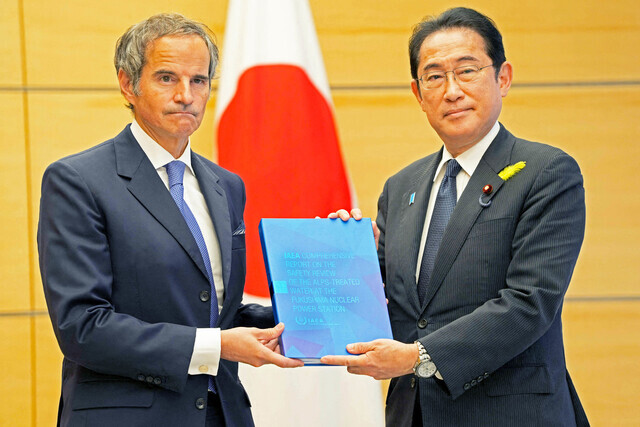hankyoreh
Links to other country sites 다른 나라 사이트 링크
[Editorial] IAEA’s green light does not grant moral justification for Fukushima water dumping

As expected, after spending the last years verifying Tokyo’s plan to release irradiated water from the Fukushima Daiichi nuclear power plant into the ocean at the behest of the Japanese government, the International Atomic Energy Agency (IAEA) has come out with its final report containing the assessment that the plan is “consistent with international safety standards.” The countdown has now begun for the Japanese government to dump 1.33 million metric tons of radioactive water whenever it wishes.
On Tuesday, IAEA Director General Rafael Grossi met with Japanese Prime Minister Fumio Kishida, delivering to him the agency’s final report. During a press conference that followed, Grossi announced the agency’s conclusion that Japan’s plan to release contaminated water is reliable from a technical standpoint. As the IAEA reviewed the case upon the request of the Japanese government from the very beginning, providing the country consultations to support the release of the wastewater, this conclusion was well expected.
It is clear that a report cannot grant moral justification to the act of dumping huge amounts of wastewater generated from a nuclear accident into the sea for decades upon decades. It is also clear that a report cannot grant the right to demand affected neighboring countries to accept the risk involved. The Japanese government and the IAEA propound “science,” but there are many important questions left unanswered.
It is expected that the nuclear-contaminated water will be released over the course of at least 30 years, but concerns such as the prospect of the Advanced Liquid Processing System (ALPS), already known for frequent breakdowns, overloading won’t fade away. They say the concentration of tritium, which the ALPS cannot filter, will be diluted by seawater to a concentration far below the safety limit, but no one can be sure of the biological influence such radioactive substances may have as they build up within the food chain.
Japan, which plans to begin releasing the wastewater this summer, is expected to make final efforts at persuading domestic fishers and the international community on the basis of the report. Grossi will be keeping pace, visiting countries where public opposition is fierce — South Korea, New Zealand and the Cook Islands, for example — to turn the tide of popular opinion.
What’s important is our government’s response. Seoul said it would determine its final position by taking into account both the IAEA’s final report and the result of last month’s field visit by an “expert inspection team” of ours, but we all know what kind of conclusion it will reach. The administration and the ruling party have proactively defended the wastewater release plan, putting on a spectacle of public seafood consumption, calling 85% of the public who oppose the release of the irradiated water conspiracy theorists.
Nevertheless, the public remains anxious. This is because the government cannot instill trust in the people.
The government should take into consideration the public’s concerns and clearly weigh the problems, holding off the enforcement of the discharge as long as possible and demanding that Japan come up with a solution. This should be communicated to Grossi, who will be visiting South Korea, as well. South Korea should prepare provisions to the highest possible standard in case the discharge is enforced regarding the management of domestic waters and seafood safety.
Please direct questions or comments to [english@hani.co.kr]

Editorial・opinion
![[Column] Is Korean democracy really regressing? [Column] Is Korean democracy really regressing?](https://flexible.img.hani.co.kr/flexible/normal/500/300/imgdb/original/2024/0705/2917201664129137.jpg) [Column] Is Korean democracy really regressing?
[Column] Is Korean democracy really regressing?![[Column] How tragedy pervades weak links in Korean labor [Column] How tragedy pervades weak links in Korean labor](https://flexible.img.hani.co.kr/flexible/normal/500/300/imgdb/original/2024/0703/8717199957128458.jpg) [Column] How tragedy pervades weak links in Korean labor
[Column] How tragedy pervades weak links in Korean labor- [Column] How opposing war became a far-right policy
- [Editorial] Korea needs to adjust diplomatic course in preparation for a Trump comeback
- [Editorial] Silence won’t save Yoon
- [Column] The miscalculations that started the Korean War mustn’t be repeated
- [Correspondent’s column] China-Europe relations tested once more by EV war
- [Correspondent’s column] Who really created the new ‘axis of evil’?
- [Editorial] Exploiting foreign domestic workers won’t solve Korea’s birth rate problem
- [Column] Kim and Putin’s new world order
Most viewed articles
- 110 days of torture: Korean mental patient’s restraints only removed after death
- 2Real-life heroes of “A Taxi Driver” pass away without having reunited
- 3Koreans are getting taller, but half of Korean men are now considered obese
- 4Former bodyguard’s dark tale of marriage to Samsung royalty
- 5Can the IPEF deliver the US dream of an Asian economy without China?
- 6Chip powerhouse S. Korea struggles to strike balance between China’s demands, US pressure
- 7Around 2 mil. Koreans conscripted to labor from 1939 to 1945
- 8On South Pacific island, Korean fishermen again looking to buy sex
- 9National security advisor’s ouster could afford hard-liner Kim Tae-hyo stronger influence
- 10[Column] “Hoesik” as ritual of hierarchical obedience